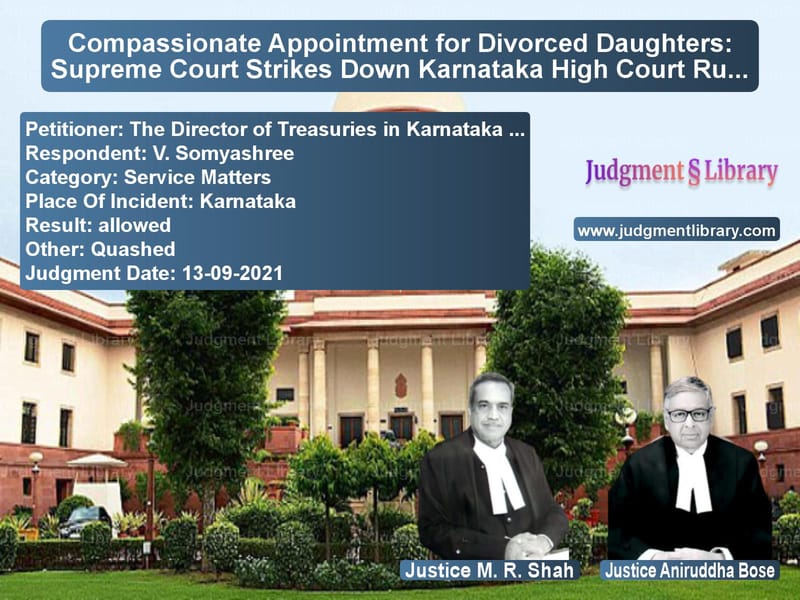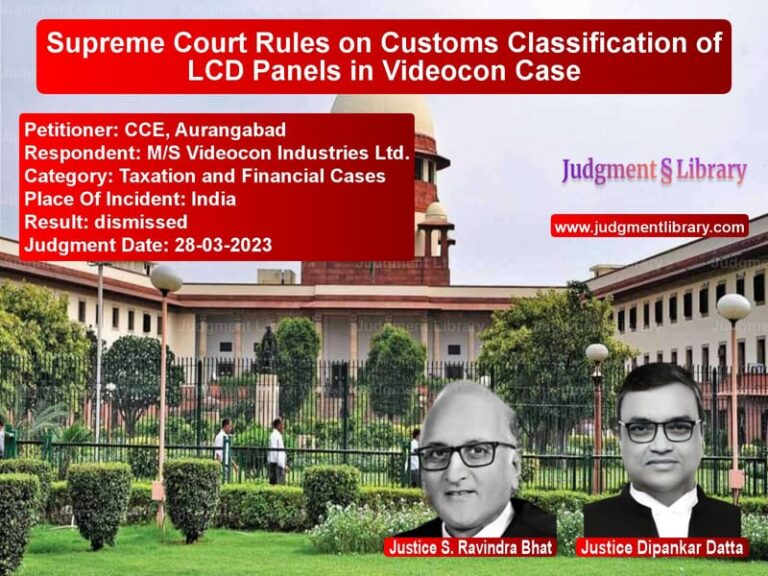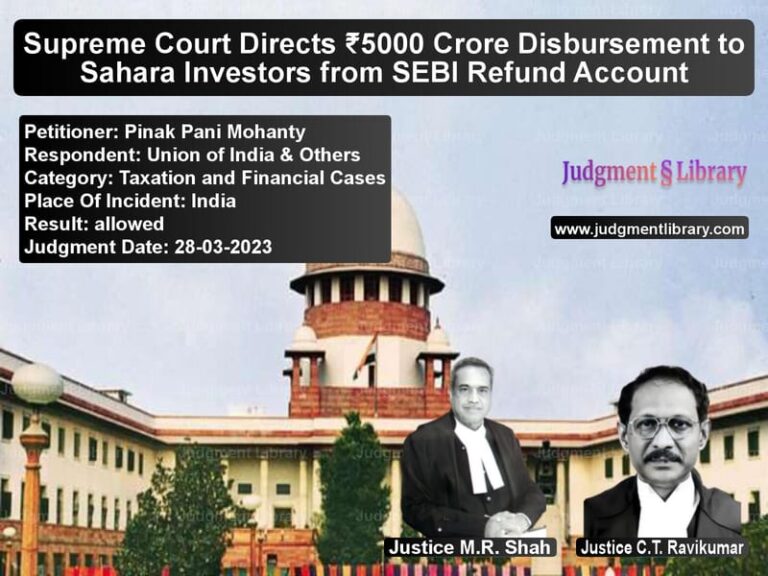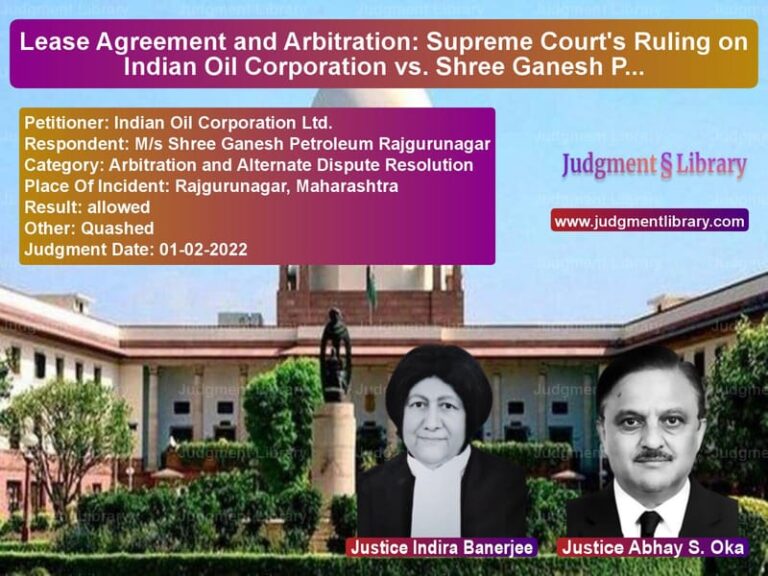Compassionate Appointment for Divorced Daughters: Supreme Court Strikes Down Karnataka High Court Ruling
The case of The Director of Treasuries in Karnataka & Anr. v. V. Somyashree revolves around the interpretation of the Karnataka Civil Services (Appointment on Compassionate Grounds) Rules, 1996. The Supreme Court was called upon to decide whether a divorced daughter was eligible for a government job under compassionate appointment rules after the death of a parent. The ruling ultimately upheld the existing rules, rejecting the High Court’s broader interpretation.
Background of the Case
The dispute arose when V. Somyashree, the respondent, applied for a government job under the compassionate appointment scheme following the death of her mother, Smt. P. Bhagyamma, who was employed as a Second Division Assistant at Mandya District Treasury. At the time of her mother’s death on March 25, 2012, Somyashree was married. However, she subsequently obtained a divorce and applied for compassionate appointment on March 21, 2013.
The Karnataka State Administrative Tribunal rejected her application, ruling that the compassionate appointment scheme did not include divorced daughters under the definition of dependent family members. However, the Karnataka High Court later overturned this ruling and held that divorced daughters should be treated the same as unmarried and widowed daughters. The state government, disagreeing with this ruling, appealed to the Supreme Court.
Key Legal Issues
The Supreme Court was tasked with answering the following questions:
- Does a divorced daughter qualify for compassionate appointment under the Karnataka Civil Services (Appointment on Compassionate Grounds) Rules, 1996?
- Can courts expand the definition of dependent family members beyond what is explicitly stated in government service rules?
- Does the intent of the compassionate appointment scheme include divorced daughters?
Petitioner’s Arguments (State of Karnataka)
The state government, represented by Shri V.N. Raghupathy, presented the following arguments:
- The Karnataka Civil Services (Appointment on Compassionate Grounds) Rules, 1996, explicitly list only unmarried daughters and widowed daughters as eligible for compassionate appointments.
- The High Court exceeded its jurisdiction by interpreting the rules in a way that included divorced daughters, which was not the intent of the original policy.
- The respondent had applied for divorce immediately after her mother’s death, indicating that her divorce may have been motivated by the desire to qualify for a government job.
- The policy for compassionate appointments is meant to provide immediate relief to dependent family members, and at the time of her mother’s death, the respondent was married, not dependent.
Respondent’s Arguments (V. Somyashree)
The respondent, represented by Shri Mohd. Irshad Hanif, argued:
- The intent behind including widowed and unmarried daughters was to provide relief to women who are unable to support themselves. A divorced daughter falls under the same category.
- Since she was divorced at the time of applying, she should be considered eligible under the compassionate appointment scheme.
- Other states and government policies have evolved to include divorced daughters, and Karnataka should adopt a similar progressive interpretation.
Supreme Court’s Observations
The Supreme Court reviewed the Karnataka Civil Services (Appointment on Compassionate Grounds) Rules, 1996, and made the following key observations:
- The rules clearly specify that only an unmarried or widowed daughter can be considered for a compassionate appointment.
- A divorced daughter is not included in the definition of dependent family members in the rules.
- The Court referenced the precedent set in N.C. Santhosh v. State of Karnataka (2020), which emphasized that courts cannot extend the scope of compassionate appointments beyond the stated policy.
- The timing of the divorce raised concerns. The respondent initiated divorce proceedings soon after her mother’s death, obtaining a divorce decree on March 20, 2013, and applying for a government job on March 21, 2013. This indicated that the divorce may have been sought for the sole purpose of securing employment.
- The amendment to the Karnataka Civil Services Rules in 2021 added divorced daughters as eligible candidates for compassionate appointments, but this amendment was not retroactive. The Court ruled that the amendment could not apply to Somyashree’s case, which was based on the 1996 rules.
Supreme Court’s Judgment
The Supreme Court set aside the High Court’s ruling and upheld the Karnataka State Administrative Tribunal’s decision, ruling that:
- The divorced daughter of a deceased government employee was not eligible for compassionate appointment under the 1996 rules.
- The High Court’s interpretation was incorrect and contrary to established law on compassionate appointments.
- Compassionate appointments are exceptions to regular hiring practices and must strictly follow government policies.
- Only an unmarried daughter or a widowed daughter qualified under the applicable policy at the time.
Key Takeaways from the Judgment
- Strict Interpretation of Rules: Compassionate appointment rules must be applied as written, without judicial expansion beyond legislative intent.
- Marital Status at Time of Death Matters: Since the respondent was married when her mother passed away, she did not qualify for compassionate appointment.
- Policy Changes Do Not Apply Retroactively: The 2021 amendment that included divorced daughters did not apply to cases under the 1996 rules.
- Timing of Legal Action Matters: The Supreme Court questioned the respondent’s decision to seek divorce immediately after her mother’s death, suggesting it may have been done solely to claim a government job.
- Compassionate Appointments Are Not Rights: The ruling reaffirmed that compassionate appointments are not a right but a discretionary relief governed by clear rules.
Conclusion
The Supreme Court’s judgment in The Director of Treasuries in Karnataka & Anr. v. V. Somyashree establishes a clear precedent on how compassionate appointments should be granted. By ruling against the High Court’s expansive interpretation, the Court reaffirmed that policies on government employment must be followed strictly, ensuring fairness and preventing misuse of compassionate appointment provisions. While the law has since evolved to include divorced daughters, this ruling underscores that such changes cannot be applied retroactively, preserving the integrity of employment laws.
Petitioner Name: The Director of Treasuries in Karnataka & Anr..Respondent Name: V. Somyashree.Judgment By: Justice M. R. Shah, Justice Aniruddha Bose.Place Of Incident: Karnataka.Judgment Date: 13-09-2021.
Don’t miss out on the full details! Download the complete judgment in PDF format below and gain valuable insights instantly!
Download Judgment: the-director-of-trea-vs-v.-somyashree-supreme-court-of-india-judgment-dated-13-09-2021.pdf
Directly Download Judgment: Directly download this Judgment
See all petitions in Employment Disputes
See all petitions in Public Sector Employees
See all petitions in Recruitment Policies
See all petitions in Judgment by Mukeshkumar Rasikbhai Shah
See all petitions in Judgment by Aniruddha Bose
See all petitions in allowed
See all petitions in Quashed
See all petitions in supreme court of India judgments September 2021
See all petitions in 2021 judgments
See all posts in Service Matters Category
See all allowed petitions in Service Matters Category
See all Dismissed petitions in Service Matters Category
See all partially allowed petitions in Service Matters Category







